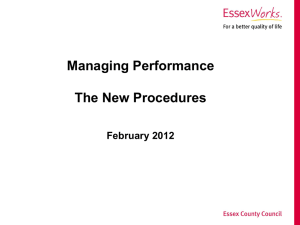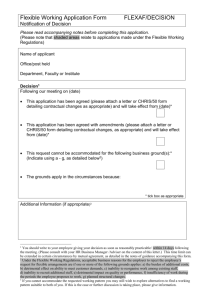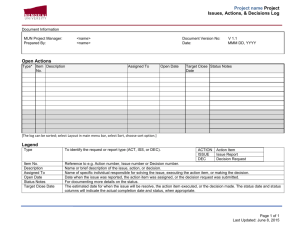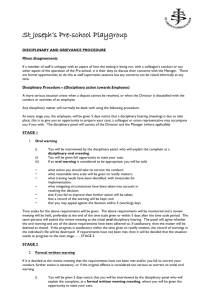MANAGEMENT OF PERFORMANCE
advertisement
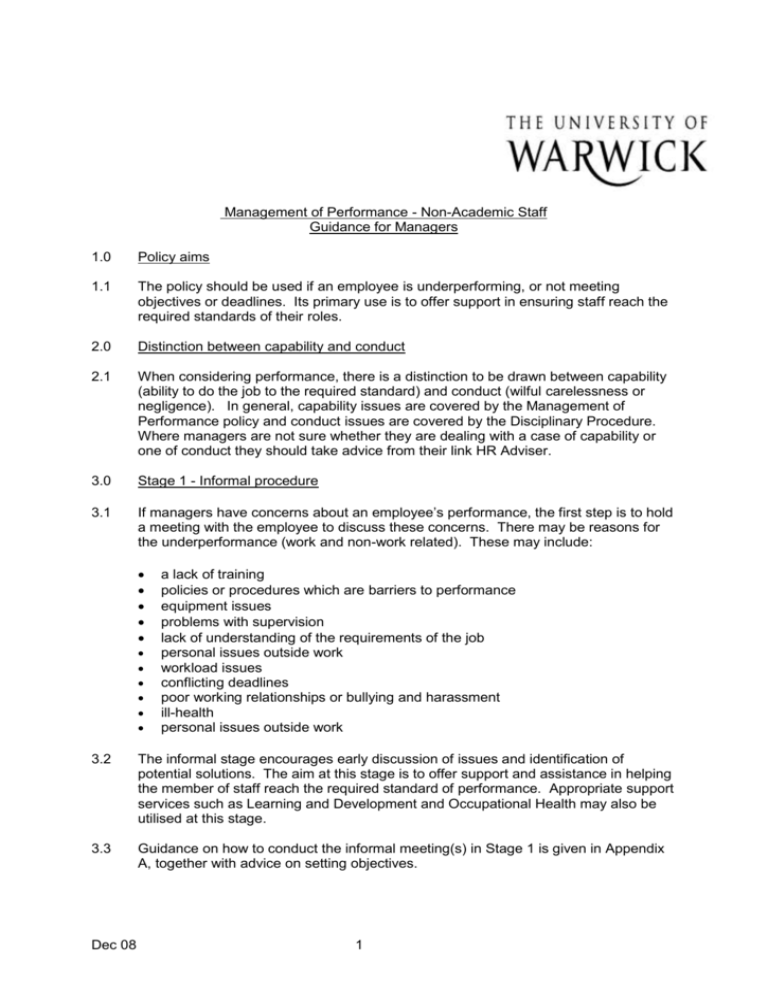
Management of Performance - Non-Academic Staff Guidance for Managers 1.0 Policy aims 1.1 The policy should be used if an employee is underperforming, or not meeting objectives or deadlines. Its primary use is to offer support in ensuring staff reach the required standards of their roles. 2.0 Distinction between capability and conduct 2.1 When considering performance, there is a distinction to be drawn between capability (ability to do the job to the required standard) and conduct (wilful carelessness or negligence). In general, capability issues are covered by the Management of Performance policy and conduct issues are covered by the Disciplinary Procedure. Where managers are not sure whether they are dealing with a case of capability or one of conduct they should take advice from their link HR Adviser. 3.0 Stage 1 - Informal procedure 3.1 If managers have concerns about an employee’s performance, the first step is to hold a meeting with the employee to discuss these concerns. There may be reasons for the underperformance (work and non-work related). These may include: a lack of training policies or procedures which are barriers to performance equipment issues problems with supervision lack of understanding of the requirements of the job personal issues outside work workload issues conflicting deadlines poor working relationships or bullying and harassment ill-health personal issues outside work 3.2 The informal stage encourages early discussion of issues and identification of potential solutions. The aim at this stage is to offer support and assistance in helping the member of staff reach the required standard of performance. Appropriate support services such as Learning and Development and Occupational Health may also be utilised at this stage. 3.3 Guidance on how to conduct the informal meeting(s) in Stage 1 is given in Appendix A, together with advice on setting objectives. Dec 08 1 3.4 In many cases, the discussions during Stage 1 are all that is needed in order to bring about an improvement in work performance. However, where this does not effect an improvement or where the problem with work performance warrants a more formal approach, the Stage 2 formal procedure should be used. 4.0 Stage 2 – Formal procedure 4.1 Managers should carefully review all the evidence, and take advice from their link HR Adviser, before deciding to progress to Stage 2. A formal investigation is carried out to establish the full facts of the case. This normally takes the form of a meeting between the manager and the employee; depending on the complexity or nature of the issues this may involve an Investigating Officer from outside the Department. Employees are entitled to bring with them a trade union representative or a colleague and managers should have an HR Adviser present. 4.2 The investigation meeting should identify: the required level of performance, actual performance and the gap between them what measures have been undertaken already what progress/improvement has been achieved (if any) any mitigating factors1 the employee has in relation to the allegation 4.3 Following the meeting the manager may issue a first written warning, which outlines the required improvement and what support will be offered to help the employee meet the requirements. This will remain on file for 12 months, but further review meetings may be held within this timeframe and further action taken if no (or insufficient) improvement happens. 4.4 As noted in 4.3 above, if no (or insufficient) improvement happens, a further investigation and meeting may result in the issuing of a final written warning, which will remain on file for 24 months. 4.5 It is important to monitor, and document, any progress throughout the review period. 5.0 Dismissal 5.1 Ultimately, if no or insufficient progress is made dismissal may be considered, following a panel hearing. The reason for dismissal will be the employee’s lack of capability to fulfil the contract of employment. 6.0 Appeals 6.1 Employees have the right of appeal against any formal sanction – written warning, final written warning, withholding an increment (see 7.0 below) or dismissal. Appeals2 should be lodged within two weeks of receipt of the written notification and a meeting will be held to consider the appeal. The Chair of the appeal hearing will be a manager more senior than one making the original decision and he/she may: confirm the original decision 1 Examples of mitigating factors are shown in Appendix B Grounds of appeal are usually further evidence not previously considered, process or procedural aspects, or that the final decision was not appropriate. 2 Dec 08 2 reduce the original penalty re-instate following dismissal or refer the matter back for a re-hearing 7.0 Withholding salary increments 7.1 The policy allows for withholding salary increments following the recommendation of a Head of Department, and normally in line with a written warning. Recommendations will be considered by a panel and employees will have the right of appeal against any decision to withhold an increment. Dec 08 3 Appendix A Guidance – Stage 1 meetings and setting objectives 1 If managers have a concern about performance they should discuss this at the earliest opportunity with the employee at a meeting. The employee should be given advance notice of the meeting and its purpose. 2 As this meeting is considered “informal” in the policy, employees do not have the right to bring with them a trade union representative or colleague. However, if such a request is made managers should consider this. If managers do allow employees to bring someone with them to the meeting they may also wish to be accompanied by another member of staff in the Department. 3 Conducting such a meeting to discuss unsatisfactory performance is never an easy task. As a manager you should be open, honest and unambiguous in your communication and should: stick to facts to avoid expressing personal opinions give specific examples to avoid generalisations ask open questions listen actively to what the employee is saying ensure your tone is friendly and not accusatory use positive words such as ‘improvement’ and ‘achievement’ rather than negative words such as ‘failure’ or ‘weakness’ focus on future improvement rather that past inadequacies always check for understanding, for example asking employee to state or summarise their understanding of what has been discussed 4 At the meeting managers may wish to begin with asking the employee what they enjoy about the job - this may make the discussion easier and reduce any defensiveness on the employee’s part. 5 Managers should then move on to an open discussion which covers: 6 clarifying the requirements of the job explaining clearly the shortfall between the employee’s performance and the required standards by giving the employee specific examples of instances where their performance has fallen below the required standard if possible, identifying the cause of the shortfall asking the employee’s opinion of what they can do to improve their performance identifying any support which might be required agreeing a reasonable time-scale for the individual’s performance to improve setting a date for a review meeting to ensure that progress is being made It may be helpful to use the SMART framework to set objectives: Specific - objectives should specify what the outcome will be Measurable - managers, and staff, should be able to measure an outcome Achievable - objectives should be achievable and attainable Realistic - objectives should be realistic within the resources available Dec 08 4 Timely - there should be clear deadlines for achieving the objectives 7 The type and range of help which can be provided to the employee will vary depending on the nature of the issues identified and the role they occupy but could include3: 8 review of the availability of suitable resources or materials training or coaching the identification of a mentor review of the amount of supervision needed referral to the Occupational Health Adviser or Counselling service After the meeting the manager and employee should agree a written statement containing: a detailed summary of the improvements required and the standards to be met details of areas where support is needed, and the means of achieving that support any agreed adjustments to the working environment clear targets and timescales for demonstrable improvement (SMART objectives) 9 If agreement cannot be reached on the written statement, the employee may make a written record of his/her areas of disagreement and these will be considered during and at the end of the monitoring period, before any further action is taken. 10 Managers should monitor and assess the employee’s performance for an appropriate time and keep a written record of this process. At the end of the monitoring period, the manager will meet with the member of staff to review progress. Managers should outline outcomes, identifying any progress and where further improvements may be needed. Employees should be asked for their input, including raising any relevant factors that should be taken into account when deciding future action. The manager should decide, in the light of the issues discussed, what action is appropriate. Available options include: 3 no further action under the procedure as the member of staff’s performance has improved sufficiently an extension of the Stage 1 monitoring stage progression to Stage 2 of the procedure if no significant improvement is evident. Further examples are contained within 3.4 of the policy Dec 08 5 Appendix B Examples of mitigating factors and potential solutions Mitigating factors Inadequate or insufficient training Out-of-date policies or inadequate procedures that do not permit efficient or effective work Tools and/or equipment that do not work properly or frequently break down Potential solution Source or deliver training to rectify Update systems or procedures, reappraise policies for efficiency Investigate replacement/replacement. Seek advice from appropriate department Consider alternative management or development for manager and interim arrangements until performance achieves required level Spend time explaining the job description, outline standards required, talk through the role, explaining why standards are required and the impact of not achieving them on the rest of the team/department/University Ensure all instructions are clear and unambiguous; write down if necessary. Check understanding with employee and agree when reviews will be held. Review workloads of others in the department. Is there room for some movement of tasks/responsibilities elsewhere, without demoting the position? Would another post be possible? Could temporary help be found to assist? Review the targets - can the dates or levels of achievement be changed? Is there a way of redistributing workloads across the team/ department? Investigate the reasons why. Could internal/external mediation help? Use the appropriate policy and procedure Consider using occupational health to assess health and wellbeing, and advice on prognosis, timescales and action to take. Consider whether or not this constitutes disability and whether reasonable adjustment should be made. Treat the issues sympathetically but set timescales for the resolution of the impact on work issues. Refer the employee to the occupational health service or the counselling services available within the University. Poor quality or inadequate supervision and/or support Lack of understanding on the employee's part about his/her job duties, priorities or goals, which may arise because no one has properly explained these issues or given the employee feedback Unclear instructions Work overload Unrealistic targets or deadlines Poor working relationships Alleged bullying or harassment Ill-health which is affecting performance Personal problems outside work which is affecting performance in work Dec 08 6
